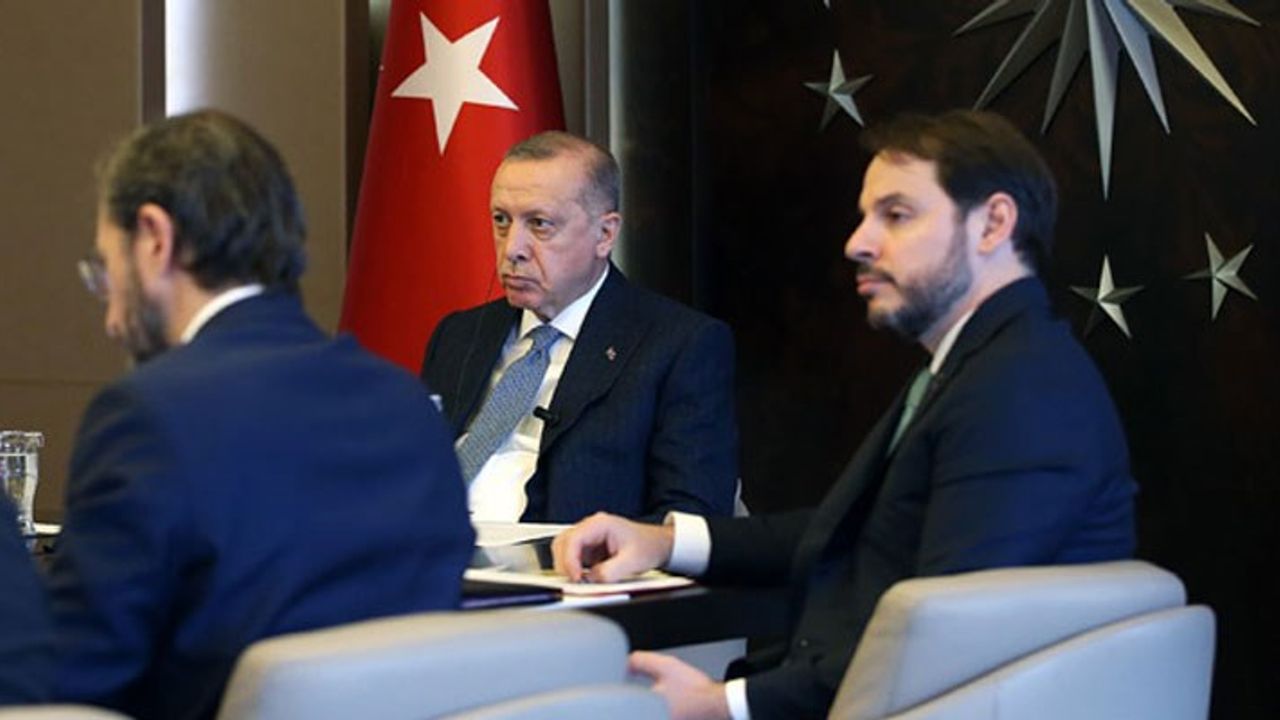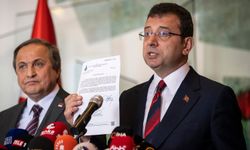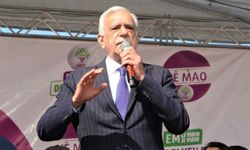Turkey's authentic government style of one-man Executive Presidential Regime is experiencing a new crisis due to recent plummetting of the Turkish Lira which only deepened after instagram-resignation of the Minister of Treasury & Finance that left the country's media in darkness for a whole day, yet resulting in stronger currency despite the absence of a minister in charge of the country's finances.
For a long time there had been rumours that there was a cold wind blowing in the palace in Ankara, between the President Erdoğan and his son in law, Minister of Treasury & Finance Berat Albayrak. Claims of a family dispute was brought up, later refuted and all media coverage on the issue were blocked & removed. There were also rumours that the media organizations linked to the son-in-law Albayrak were given instructions to be less supportive of the governing party but instead focus on the Albayrak hold in the governing cabinet instead. While there were these rumours and claims rotating in some circles, none were confirmed and eventually made to headlines.
SON IN LAW AS A MINISTER
Turkey's economy has been in the hands of Albayrak for a long time; he has uttered words of comfort and trust stating that the President trusts him so much that he is surely bringing the country to brighter days through careful and successful policies. Yet the value of Turkish Lira against other countries currencies were signaling something else. Despite all the efforts, TL continuously dropped to historic lows each day, finally last week €1 equalling 10 TL. This was a psychological barrier for many people and the widespread calls to remove the Minister of Treasury & Finance Albayrak got even louder; to the point of IYI Party chair Akşener calling on the AKP chair & President Erdoğan either to choose the country or the son-in-law but one would have to be sacrificed for the wellbeing of the other.
CHANGING THE CENTRAL BANK PRESIDENT -AGAIN-
Amidst an environment where non-domestic investor trust in the country's market has been vanishing so rapidly, any regular economy would opt for increasing the interest rates to attract investors, but AKP's resistance against insterest rates pressure TL into an even worse situation. AS a result, the president of the Central Bank Murat Uysal -who had only served as the highest officer in the bank for 16 months- was replaced on November 7 at 3.24 am by the Presidential Strategy & Budgetary Director Naci Ağbal. Previously on July 6, 2019, Murat Uysal had become the first president of the Central Bank to be appointed through a Presidential Executive Order, to replace Murat Çetinkaya who refused to suppress interest rates to prevent Turkish Lira from falling. When Uysal was appointed as the president, Turkish Lira ranked 5,60 against USD and when he was replaced it was 8,51 after only 16 months.
ARGUMENT BETWEEN AĞBAL AND ALBAYRAK
When Naci Ağbal was appointed as the new president of the Central Bank, multiple journalists in media brought up claims that this would cause a tense situation with Berat Albayrak, as the two were known to be not getting along well in terms of applying policies. Upon Ağbal’s appointment, the next day it was claimed by the inner circle of the government’s far right ally Nationalist Movement Party MHP that President Erdoğan asked for Albayrak’s resignation upon an open statement from Presidential High Advisory Council member Bülent Arınç that there is a crisis and it cannot be ignored, and a more quiet warning that dozens of members of parliament might resign from AKP and register with the break-away DEVA Party if Albayrak remains in charge of the economy.
INSTAGRAM-RESIGNATION
Hours later, Albayrak closed his twitter account, and published a hastily written text on his instagram account announcing his resignation from his duties as minister due to his health problems. For almost 24 hours this post received no reflection in the pro-government media; having previously indulged too early into Minister of Interior Süleyman Soylu's resignation move before in April and receiving a note of warning by the Presidential office afterwards. The absolute silence of the pro-government media, hundreds of TV channels, thousands of news portals was deafening for the millions of citizens who expected a note of clarification on the matter while a handful of independent media organizations were the only ones reporting on the issue, aside from the international news agencies. However the head of Turkey’s Radio & TV High Authority RTÜK, Ebubekir Şahin -who should be impartial and non-partisan according to the definitions of the seat he is occupying- shared a tweet in support of Albayrak and declaring his support for “our cause” referring to AKP’s agenda.
MEDIA BLACKOUT
The situation went so far as to bringing up claims that Albayrak lost access to his social media accounts and whomever got hold of his accounts published this text without his knowing, to cause a stir up in the country's affairs. 12 hours later, some pro-government journalists made themselves believe in these claims and reiterated it to convince their readers, that the government is intact and as strong as ever. One of AKP’s former member of parliament and columnist for pro-government media, Mehmet Metiner targeted the leaking of internal struggles within the party to the independent media, “certain information which should remain behind closed doors should not be revealed. The Chief (President Erdoğan) must take lessons from this and do the necessary scolding to the state apparatus. Whomever leaked the information on the fight in the meeting is a traitor” accidentally confirming claims that there was a fist fight between Ağbal and Albayrak in the Palace. The media's inability to even publish the news of this instagram post once again proven the level of atmosphere of fear circling in the country; making it obvious that the one-man-regime cannot risk anyone questioning the ongoing situation or act in divergence from the plans set out by the President himself. Opposition leaders came out one after the other stating that the government has been revealed as unable to govern and must do what is necessary; HDP called for an early election as the only remedy against the ongoing financial and economic crisis which is about to turn into a political and social crisis. On the side of the critical media, the reasons why Albayrak might have resigned were being elaborated in the early hours of the resignation. Former CHP deputy and journalist Barış Yarkadaş claimed that Albayrak resigned due to Ağbal's appointment as the president of the Central Bank, and also claimed that Albayrak would soon be appointed as the Minister of Foreign Affairs; this being a first step in reshuffling of the cabinet. Yarkadaş continued "if you see current Minister of Foreign Affairs Mevlut Çavuşoğlu and Minister of Interior Süleyman Soylu as vice presidents, do not be surprised". Yarkadaş also claimed that it was Albayrak's father who advised his son to resign saying "you are getting exhausted and being held responsible for everything; you do not deserve this" which completes the notes on family notion in Albayrak's resignation text.
TURKISH LIRA'S VALUE INCREASED AFTER RESIGNATION
After Albayrak resigned, the Ministry of Treasury & Finance deleted all previous tweets from its twitter account except for the congratulatory message for the Republic Day on October 29. As the markets opened several hours later, Turkish Lira started gaining value against foreign currencies and throughout the day of government’s silence, it in fact rose by 5%; only half covering for the 10% decrease when Albayrak was brought in charge of the treasury two years ago. In the late hours of October 9, and 27 hours after Albayrak’s resignation, the Presidential Communications Directorate made a statement and announced that AKP chair & President Erdoğan accepts Berat Albayrak’s request to be “pardoned” from his duties as minister, appointing Lütfi Elvan as the new minister in charge of the economy. After Elvan’s appointment as the new Minister of Treasury & Finance, Turkish Lira started losing value again, in only several hours the TL lost 2.3% value.
MEANING FOR AKP'S FUTURE
Now what does this mean for the AKP? It seems the long-term sing-party government is suffering a deep political crisis… Compared to the resignation move by Soylu in April which strengthened Soylu’s seat in the cabinet, the Albayrak resignation only revealed a deeper problem in the government. Media’s general silence for 24 hours, AKP spokesperson Ömer Çelik’s inability to comment on the resignation, eventually admitting the resignation as a “request to be pardoned from duties” revealed AKP as unable to hold its base together. Government ally MHP’s claims that Erdoğan asked Albayrak’s resignation have not been confirmed by Arınç’s statements about the economic crisis have proven effective in this. Perhaps the first step in finding a solution could be signaled through admitting that there is a problem but in this scenario AKP no longer presents an image of confidence and trust, but as a government that is trying to cover up obvious problems even when admitting the problems vaguely.
AKP CONTINUES LOSING SUPPORT
For a long time AKP has been losing support in the society, while the government ally MHP was increasing. Recent polls have been stating that the party has been below 30% for the first time in its history, after getting elected with 33% in 2002 and continusouly increasing its vote share over the years. In the period to come however, it is highly likely that AKP will continue losing support in the society -primarily to its government ally MHP- and this hurtful agreement between the two parties is leading to a growingly unbalanced equation between the power struggle of the two parties at the top. While enjoying the government alliance, MHP on the one side defends Erdoğan as the president boosting support for the government and on the other side initiates critical campaigns concerning the economy such as "hanging bread for the poor" as there are families that cannot afford bread. The carefully constructed critical moves of MHP are bringing more votes for the government ally, and keeps the government at its place while disturbing the existing balance between the allies, for now... The minor government ally MHP is going to hold its general assembly to possibly re-elect its leadership and set up its agenda for the next years in March 2021 and this may as well be a milestone in Turkey’s path ahead regarding declaration of an early election. Previously in 2018 when President Erdoğan was stating that there is no agenda on holding an early election in mid-April, MHP chair Bahçeli came out to say that the country needs to hold early elections, which it did on June 24, 2018 that elected Erdoğan as the first president of the country under its new regime of Executive Presidency. Bahçeli, having previously led Bülent Ecevit’s Democratic Left Party DSP government into elections only to lose and cause a major change in the political arena in Turkey in 2002, might do it again almost two decades later this time to lead governing AKP into a losing election. One thing is certain though, no matter how many points AKP might be collecting from the international crises in its extended region due to “rally around the flag” effect, it is losing twice as much when the party’s supporters look at the prices in the markets and the “fire in the kitchen”. The unsustainable economic policies, pressure on rights & liberties -which serve as the basis of quality development and growth- and targeting of independent media have led the party to its current situation and before the governing party and the one-man-regime changes, Turkey’s prospects for proper recovery from the crisis-factory conditions do not seem like they will change; we have seen the signifiers of this in the performance of an empty seat as the Minister of Treasury and Finance being the best minister Turkey had in over a decade.






